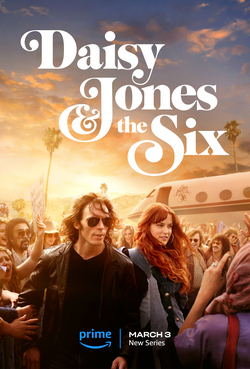
The Problem with Daisy Jones & the Six
Stories, at their core, are about relationships. A story needs characters who want something and characters who interact in meaningful ways. The mini-series “Daisy Jones & the Six” lacks both of these critical elements.
Based upon the book of the same name, “Daisy Jones & the Six” follows the path of rockers Billy Dunn and Daisy Jones as they’re thrust together in the rock and roll maelstrom of the 1970s. The book by Taylor Jenkins Reid is said to be loosely inspired by the lives of the members of Fleetwood Mac. If that were the goal of this mini-series, then mission accomplished – well, the “loosely” part, anyway.
Normally I’d call out the stellar performance of the players: persevering despite a terrible script. Or great production values despite lackluster performances. Or I’d praise the musical score or writing. But there is nothing here that inspires me. I’ll cut to the chase: If you want to see the story of a rock and roll band and feel the passion, joy, heartbreak, and misery – just watch any episode of “VH1: Behind the Music.” If you want to watch a made-up story of a rock and roll band that self-destructs – watch “That Thing You Do” or “Eddie and the Cruisers.” A single hour of any of these other shows will be more entertaining than the entirety of “Daisy Jones & the Six.”
Riley Keough (granddaughter of Elvis Presley) as Daisy Jones is the bright spot in this show. While we don’t get to hear her sing (much), she has a great presence that I’m looking forward to seeing more of. She does a passable job of channeling her inner Stevie Nicks, twirling like a dervish in flowing gowns. When she’s on-screen, we get a feeling that *something* is happening. The series takes nearly two-and-a-half episodes to finally get Daisy and The Six together – much too long IMHO. Also, the emergence of Daisy from a plucky singer-songwriter to the headstrong “leader of the band” happens practically overnight with almost no transitional events is quite jarring and ultimately unbelievable.
Sam Claflin as band leader Billy Dunn could not possibly be more bland. He looks like a 40-year-old man trying to play a 20-something. His character is supposed to be a tortured soul who is forced into a grudging partnership with the mercurial Daisy whom he has a strong sexual attraction to. But the characters, and I daresay the actors, have absolutely no chemistry. There is not a moment when I felt that Billy was attracted to Daisy. In fact, all I could sense was his compounding dread at having to be in the same room with her.
The other band members are mere stage props. Josh Whitehouse plays Billy’s best friend who believes he’s the better musician and is forced to take a back seat when their bass guitarist drops out. Camila Morrone plays Billy’s long suffering wife. Suki Waterhouse plays the keyboardist and secret lover to Will Harrison (playing Billy’s brother and guitarist). And Sebastian Chacon rounds out the band as the everyman drummer who marries a movie star. To say these are stereotypical rock and roll tropes would be to state the obvious.
There are some other characters who contribute to the story. The wonderful Nabiyah Be is wasted as an avatar for a Donna Summer-like lesbian whose story was so orthogonal to the main thread that it could easily be left out and no one would be the wiser. Tom Wright plays the world-wisened Barry Gordy-ish record producer (whom Billy claims he loves more than once, but we never see that love on the screen). Ross Partridge pops up as the band manager. And Timothy Olyphant plays a sort of male Yoko whom Daisy marries when she runs away to Greece – and summarily ditches after she ODs.
We never get a sense of how great this band is because we never really hear them play a song. There are a few scenes in the studio where Billy and Daisy trade barbs, but we never see or hear that magical moment when their voices and the music transcend their individual talents. There are a few concert scenes where we hear snippets of songs. But even in the final episode where they play their swan-song concert, Billy and Daisy never mesh and the songs never deliver.
The advantage that a mini-series has over motion pictures is run-time. In ten episodes the show runners have the luxury of time to really expose the characters and their relationships. We’ve seen this done exceedingly well in series like “Devs” and “The Queen’s Gambit.” Here, series creators Scott Neustadter and Michael H. Weber, and writer Jihan Crowther, completely miss the mark. We don’t know what any of these people really want. We don’t get deep into their feelings or their relationships. In the end, all I could hope for was that the series would just please stop. And when it did, I went to YouTube and watched “The Making of Rumors – The Fleetwood Mac Story.” Now, *there* is a story of love, heartache, and Rock-n-Roll.